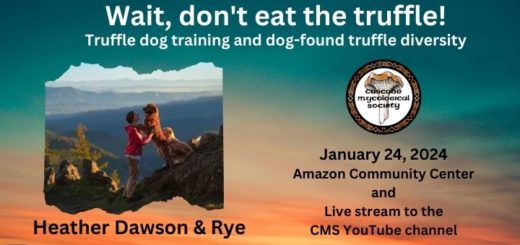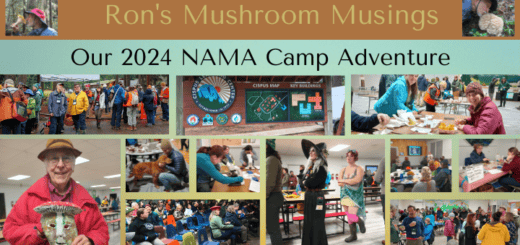A Profile of Freeman Rowe
While taking the Biology of Mushroom class at Lane Community College (LCC) in 2018, Sioux Sternath heard a few stories that indicated there was a relationship between the class she was taking, the Mount Pisgah Arboretum Mushroom Festival, and the Cascade Mycological Society. She decided she wanted to learn more. So she asked her class instructor, Susie Holmes, what steps she should take. Ms. Holmes answer was to talk to the person at the center of it all – Freeman Rowe. Below is the result of an interview Sioux had with Freeman Rowe.
Freeman Rowe- Eugene’s own Mushroom Guru
At 88 years old Freeman Rowe still remembers his first foraging experiences as a youth. He grew up in Hillsboro in northern Oregon during a time where living off the land was part of life. He has fond memories of taking his mother’s strainer down to a little creek not far from his home to see what he could find or catch. She was none too pleased about his use of her strainer, however, no bigger prize, as he put it, could make his mother happier than him coming home with a fresh caught fish and her favorite pink bottom mushrooms, picked in the nearby meadow, for dinner.
Upon graduation from Hillsboro High in 1948, he was awarded a scholarship to nearby Pacific University in Forest Grove where he went on to study biology and botany. He also was awarded a Natural Science Foundation Grant that allowed him to study at the University of Oregon (UO), here in Eugene as well as Oregon State University (then Oregon State College) in Corvallis. He did have a few years intermission, when he joined the US Army in 1951 and was stationed in Germany.
Freeman first met Rhoda Love while enrolled in a botany class together at the UO. He recalls how stringently old school their European professor was. Love had previously been studying mycology (mushroom biology) at the University of Washington and kept phenomenal notes that were of considerable use to Rowe as he began to delve more deeply into the amazing world of fungi.
He delighted in his first teaching position about six miles from the coast, in Lincoln County at Toledo Jr. High school, where coastal access and interesting marine life would add to his biological studies. He remained there for about ten years, when hired by Lane Community College (LCC) in 1968 as Associate Professor of Biology. It wasn’t until the 70’s new innovative teaching methods promoting classes that were relative to students’ lives, that Rowe along with colleague Tom Wayne developed biology emphasis courses creating such classes as, field botany, wildflowers of Oregon and mushroom biology among others. All of these popular courses continue to be offered today.
According to Rowe the Wildflower Festival was actually the predecessor to the mushroom festival. He and Love were involved with the Mount Pisgah Arboretum (MPA) which was in financial trouble so they decided to hold a wildflower festival to raise money. He claims the Flower Festival was actually Loves brainchild, grossing enough money to keep the caretaker on until winter. That’s when Rowe decided to have a mushroom festival, as well in the fall; unexpectedly it was an even bigger success.
Rowe witnessed mushroom clubs start up and die off as people came and went along with their enthusiasm. He wanted to form a group that had the strength and commitment to continue on long after he was gone. So, as he was retiring, he encouraged his students to form the Cascade Mycological Society. Now, after 40 years of mushroom biology classes Eugene has fostered quite a large and committed community of people who appreciate our local fungi.
Although Rowe retired from his full-time teaching position in 1988, he continued on at LCC part time teaching mushroom biology until 1998. He was than temporarily replaced a few times by different local mycologist such as his former student Marcia Peeters; another committed and influential person in the development of the Mount Pisgah Arboretum Mushroom Festival.
In 2008 his permanent replacement, Susie Holmes was hired. Not only was she his former student from 1997 but was also his teachers aid his final year at Lane in 1998. Rowe expressed how glad he is to know that this class is in good hands. He says of Holmes’, that “she is such an enthusiastic and charismatic person who would do well no matter what field she chose. She is a most enthusiastic teacher whose love of mycology is contagious.” She was an excellent student as well as teacher’s aid that began taking important phonology records from the start. Mushroom Biology has progressed and developed under the tutorage of Holmes, while keeping alive some Rowe traditions like cooking mushrooms the last day of class.
May 14, 2004 marked the dedication of the Rowe-Love Herbarium at Lane CC, while celebrating the 25th anniversary of the MPA Flower Festival. Both Rowe and Love were dedicated instructors who designed programs and courses that set a strong foundation for the current biology curriculum. They have both served in various capacities on MPA board of directors, were continually involved in numerous ways with the community, giving presentations and workshops as well as contributing to land management and conservation efforts in the region. Love also has a large following of students who recognized her as a prominent instructor and botanist as she has also served in many leadership positions including the Native plant society of Oregon (NPSO) State Vice President and Oregon Flora Project Leader and editor of their newsletter.
Rowe was unable to attend or forage for the fair this year, however, with at least 351 species of mushrooms exhibited and over 5,500 in attendance, he was able to rest easy. His desire to organize this event with enough enthusiastic committed supporters to carry on even in his absence has been fulfilled. He has enjoyed watching this, his child, as he put it, grow to be such an overwhelming success.
Rowe also spent many years as a prominent figure at Eugene’s farmers market, selling mushrooms, in season, as well organic produce he and a friend grew on his friend’s farm. After all he grew up playing in the dirt, something some people never outgrow. He expressed how he enjoyed interactions with his friends and customers every Saturday at the Farmers market. He was known for being willing to identify mushrooms that were brought to his booth, The Gourd Patch.
Something most people are unaware of, is how important mushrooms are to our ecosystem and why clear-cutting trees destroys it. Mycorrhizal fungi help plants and tree roots absorb nutrients and fight off harmful, soil-dwelling predators. In exchange, the fungus receives sugars and nutrients from its host. This is called a symbiotic relationship, where the tree and mushroom’s need for survival are dependent on each other. Fungi play a vital role in the biosphere and are essential to the recycling of nutrients in all terrestrial habitats because they are the dominant decomposers of complex components of plant debris, such as cellulose and lignin. This is why, when they clear-cut a forest, simply planting new trees doesn’t restore what has been destroyed. An ecosystem is most complex from the spotted owl down to the mushrooms and humus on the ground beneath our feet.
We are fortunate to have people like Freeman Rowe, as well as, so many committed people, engaged in our local mycological societies, not only to educate the public, but to share the wealth of knowledge they have obtained through life’s experiences. One of the wonderful things about Eugene and Lane CC is the feeling of community. People gathering to help educate and teach one another valuable information, as well as looking after our fungi community, in an effort to protect it. I am proud to say I’ve learned to never again take for granted what is underneath my feet.





